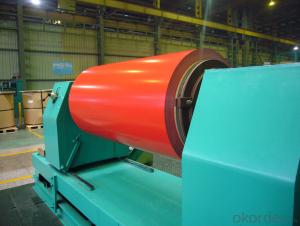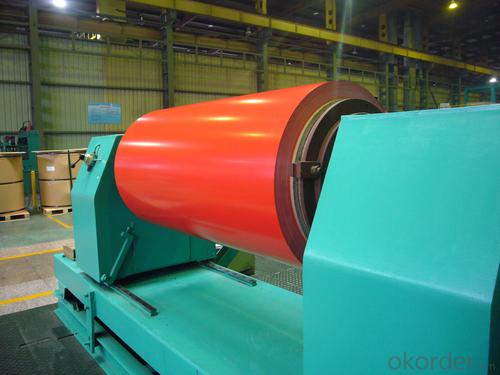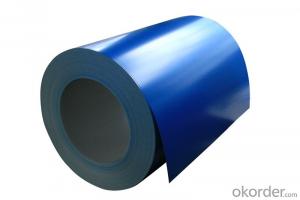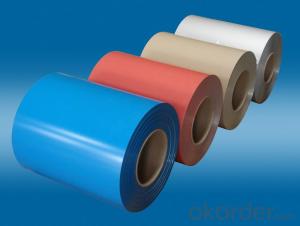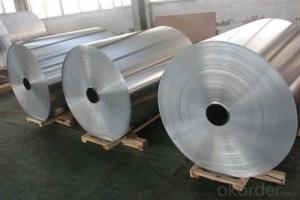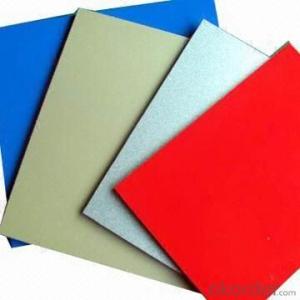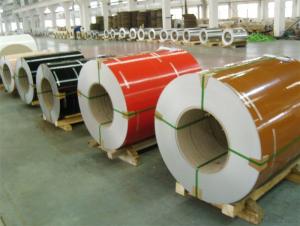PVDF Coated Aluminum Coil for Channel Letters - AA1xxx
- Loading Port:
- China Main Port
- Payment Terms:
- TT OR LC
- Min Order Qty:
- -
- Supply Capability:
- -
OKorder Service Pledge
OKorder Financial Service
You Might Also Like
Product Description:
1 Specifications of PVDF Coated Aluminum Coil/Sheet
Alloy | AA1050,AA1060, AA1070, AA1100, AA3003, AA3004, AA3005, AA3105, AA5005, AA5052, AA5754, AA5083, AA8011 |
Temper: | H12, H14, H16, H18, H22, H24, H26, H32,HO, F |
Thickness: | 0.10-4.0mm |
Width: | 10mm- 2000mm |
Coating | PVDF |
Painting Thickness | Standard 16-25 microns, max 40 microns |
Color | Acording to Ral colors or customer’s samples |
Standard: | GB/T17748-1999, ASTM, ISO, EU standard |
Special Specification is available on customer’s requirement | |
PVDF(fluorine-carbon) Coating
PVDF(fluorine-carbon) coating :made of fluorine carbon resin, pigment, ester solvent, after high temperature roasting and baking, the paint is solidified to dry film with super weather resistance. PVDF coating also can be classified as traditional PVDF and nanometer PVDF coating.
A.Traditional PVDF Coating, with KYNAR500 PVDF, two or three times for coating and baking, has good properties of anti-acid, anti-alkali and is durable in atrocious weather and environment, keeping 15 years no unwonted fading. In view of these facts, we recommend this panel applied for external wall cladding.
B.Nanometer PVDF Coating, which different with traditional PVDF is the clear coating. It contains nanometer element, which can protect panel from pollution, Because nanometer has self-cleaning effect, It easy to get rid of dust and pollution by raining or water.
- Q: How to pull the aluminum coil purchased into aluminum sheet?
- You can use decoiler machine, but after decoiling, the embossment of embossed aluminum sheet will become very shallow.
- Q: How are aluminum coils cut and shaped?
- Various methods and tools are utilized to cut and shape aluminum coils, depending on the desired size and shape. Slitting, shearing, and laser cutting are the most commonly employed techniques. Slitting is the act of dividing a wide coil into narrower strips. This procedure entails passing the coil through a series of circular blades that make precise cuts along its length. Thin aluminum strips are typically produced using this method, which can then be further processed or utilized in various applications. Shearing is another popular approach for cutting aluminum coils. It involves the use of a machine with a moving blade to slice through the coil. By applying pressure to the coil, a clean and straight cut is achieved. Shearing is commonly employed for cutting thicker aluminum coils and is ideal for creating straight cuts without deformations. Laser cutting is a more advanced technique used to cut and shape aluminum coils. It employs a high-powered laser beam to either melt or vaporize the metal along a predetermined path. This method offers exceptional precision and enables the creation of complex shapes and designs on the aluminum. Laser cutting is widely used in industries that require intricate and detailed cuts. Following the cutting process, various methods such as bending, rolling, stamping, or forming can be employed to further shape the aluminum coils. These techniques allow for the creation of different geometries and forms based on the specific requirements of the intended application. Overall, the cutting and shaping of aluminum coils involve a variety of techniques and tools, each suitable for different requirements. The choice of method depends on factors such as the coil's thickness, desired shape, and the level of precision necessary for the final product.
- Q: Are aluminum coils suitable for construction purposes?
- <p>Yes, aluminum coils can be used for construction. They are valued for their lightweight, corrosion resistance, and high strength-to-weight ratio, making them ideal for applications such as roofing, facades, and structural components. Aluminum's malleability allows for easy shaping and forming, which is beneficial in various construction projects. It's also sustainable due to its recyclability, reducing environmental impact.</p>
- Q: Can aluminum coils be used in refrigeration systems?
- Yes, aluminum coils can be used in refrigeration systems. Aluminum is a popular choice for coil materials in refrigeration systems due to its excellent heat transfer properties and corrosion resistance. Aluminum coils are lightweight, durable, and efficient in transferring heat, making them suitable for use in various refrigeration applications such as air conditioning units, refrigerators, and freezers. Additionally, aluminum coils are easier to shape and install compared to other materials, making them a preferred choice for manufacturers.
- Q: What types of aluminum coils are there that are designed for particular applications?
- <p>Yes, there are various types of aluminum coils designed for specific purposes. For instance, there are coils for construction, which are often used for roofing and siding. Coils for automotive applications are used in manufacturing car parts. Reflective coils are ideal for heat reflection in industries like food processing. Coils for electrical applications are used in transformers and wiring. Each type has specific properties like thickness, strength, and surface finish tailored to meet the requirements of their respective industries.</p>
- Q: How much is aluminum-plastic panel with the 0.155mm thick aluminum per ton?
- The price is around 17000 yuan per ton, but you need to take the surface effect into account
- Q: How do aluminum coils contribute to lightweight construction?
- Aluminum coils play a crucial role in lightweight construction due to the inherent properties of aluminum as a metal. Aluminum is known for its low density, which means it is significantly lighter than other metals such as steel or copper. When aluminum is formed into coils, it allows for a greater surface area and, therefore, more efficient heat transfer and distribution. By utilizing aluminum coils in various applications, such as in the automotive, aerospace, and construction industries, the overall weight of the structure or product is significantly reduced. This reduction in weight offers several advantages, including improved fuel efficiency in vehicles, increased payload capacity in aircraft, and easier handling and installation in construction projects. Furthermore, the lightweight nature of aluminum coils enables designers and engineers to create more innovative and energy-efficient designs. With less weight to support, it becomes possible to use thinner and lighter materials for other components, leading to additional weight savings. This can result in cost savings during manufacturing and transportation, as well as reduced environmental impact. Moreover, aluminum coils are highly corrosion-resistant, which makes them ideal for outdoor applications. Their resistance to rust and corrosion adds to their durability and longevity, ensuring that lightweight structures made with aluminum coils can withstand harsh environmental conditions. In summary, aluminum coils contribute to lightweight construction by providing a lightweight, yet strong and durable material. This enables designers and engineers to create more efficient and sustainable structures, vehicles, and products. The use of aluminum coils not only reduces the weight of the overall construction but also offers benefits such as improved fuel efficiency, increased payload capacity, and cost savings.
- Q: Are aluminum coils suitable for construction applications?
- Indeed, construction applications can make good use of aluminum coils. Aluminum, a material known for its lightweight and durability, is extensively utilized in the construction sector. Aluminum coils find frequent application in roofing, siding, gutters, and other exterior uses owing to their resistance against corrosion and ability to withstand inclement weather conditions. Furthermore, their simple installation and maintenance procedures make them highly favored by contractors. Moreover, aluminum coils can be painted or coated to enhance their visual appeal and blend with the overall architectural design of a structure. Ultimately, aluminum coils offer a dependable and economical option for construction purposes.
- Q: What precautions should be taken when handling aluminum coils to ensure safety?
- <p>When using aluminum coils, safety measures include wearing appropriate personal protective equipment such as gloves and safety glasses to prevent cuts and eye injuries. Ensure the work area is well-ventilated to avoid inhaling fumes from any processes involving the coils. Keep the coils dry to prevent electrical hazards. Use proper handling equipment to avoid back injuries from heavy loads. Always follow the manufacturer's guidelines for the specific aluminum coil products being used. Regularly inspect the coils for any signs of damage or wear that could lead to accidents.</p>
- Q: What benefits does anodized aluminum offer when compared to regular aluminum coils?
- <p>Anodized aluminum coils offer several advantages over standard ones. They have enhanced corrosion resistance due to the protective oxide layer formed during the anodizing process. This layer also improves wear resistance and increases the coil's durability. Anodized coils can be easily colored, providing a wide range of aesthetic options without affecting the material's performance. Additionally, the anodized surface is more resistant to scratches and can maintain a polished appearance longer. Overall, anodized aluminum coils are more robust, visually appealing, and longer-lasting compared to standard aluminum coils.</p>
Send your message to us
PVDF Coated Aluminum Coil for Channel Letters - AA1xxx
- Loading Port:
- China Main Port
- Payment Terms:
- TT OR LC
- Min Order Qty:
- -
- Supply Capability:
- -
OKorder Service Pledge
OKorder Financial Service
Similar products
Hot products
Hot Searches
Related keywords
